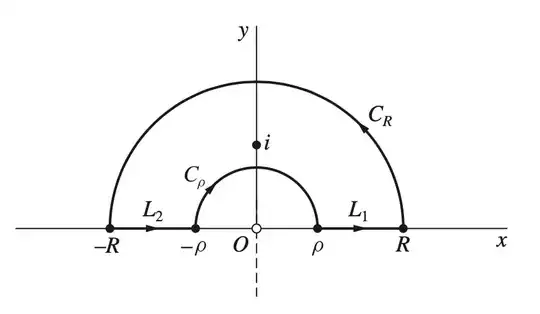The question asks to compute
$$\displaystyle\int^\infty_0\frac{(\ln x)^2}{1+x^2}\,dx$$
but I have no idea how to do that. I have thought about using the following branch cut but doesn't seem to work.
 Branch Cut Here
Branch Cut Here
Asked
Active
Viewed 197 times
0
metamorphy
- 39,111
Alvin
- 7
-
That contour won't help unless you convert the integral to one on $(-\infty,,\infty)$. But a keyhole contour, $\gamma$ say, would be useful. You can compute $A_n:=\int_0^\infty\frac{\ln^xdx}{1+x^2},,0\le n\le2$ by expressing $B_n:=\oint_\gamma\frac{\ln zdz}{1+z^2},,1\le n\le3$ [sic] in terms of them, then evaluating the $B_n$ by the residue theorem. – J.G. Apr 19 '22 at 16:13
-
(Sorry, $A_n,,B_n$ should be respectively defined in the above comment as $\int_0^\infty\frac{\ln^nxdx}{1+x^2},,\oint_\gamma\frac{\ln^nzdz}{1+z^2}$.) – J.G. Apr 19 '22 at 16:22
1 Answers
0
Substitute $y = \ln x$ and get
$$\displaystyle\int^\infty_0\dfrac{(\ln x)^2}{1+x^2}\,dx = \displaystyle\int^\infty_{-\infty}\dfrac{y^2}{1+e^{2y}}e^y\,dy = \frac{1}{2}\displaystyle\int^\infty_{-\infty}\dfrac{y^2}{\cosh(y)}\,dy = -\frac{1}{2}g''(0)$$
where $g = \mathscr{F}(\frac{1}{\cosh}) = \pi\operatorname{sech}(\frac{\pi}{2}y)$. So $g''(0) = -\pi(\frac{\pi}{2})^2$, which gives
$$\displaystyle\int^\infty_0\dfrac{(\ln x)^2}{1+x^2}\,dx = -\frac{1}{2}g''(0) = (\frac{\pi}{2})^3 = \frac{\pi^3}{8}$$
psl2Z
- 2,558